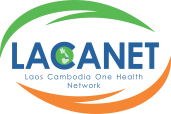You are here
What are the Project's Objectives?
The LACANET One Health Surveillance and Laboratory Network project (also referred to as “LACANET”) is an EU-funded project which brings together partners in the human health, wildlife health and animal health sectors to create capacity to survey, diagnose and understand the drivers of disease at human-animal-environmental interfaces.
The overall objective is to develop a bi-national Lao PDR-Cambodia One Health Surveillance and Laboratory Network that will enable both countries to:
- Build capacity for surveillance and field investigation for zoonotic diseases
 For this to happen, we are training district, provincial and national wildlife and livestock health authorities in both Lao PDR and Cambodia to jointly conduct surveillance for zoonotic disease pathogens in vectors, wildlife and livestock populations using various sampling techniques.
For this to happen, we are training district, provincial and national wildlife and livestock health authorities in both Lao PDR and Cambodia to jointly conduct surveillance for zoonotic disease pathogens in vectors, wildlife and livestock populations using various sampling techniques.
We are also developing capacity to implement diagnostic testing for national priority diseases at the human-animal-environment interface between both human and veterinary diagnostic laboratories, using whenever possible similar techniques and standard operating procedures.
- Improve laboratory capacity to detect zoonotic diseases

Laboratory experiments and analyses represent a significant part of the LACANET project, since we need to analyse all samples taken from the field. The Cambodian National Animal Health and Production Research Institute (NAHPRI) and the Lao PDR National Animal Health Laboratory (NAHL) regularly receive animal samples from suspected disease outbreaks from various Lao and Cambodian provinces for testing. Improving Lao and Cambodian laboratory capacity therefore appears to be critical. Therefore, the Institut Pasteur du Cambodge (IPC) and the Lao-Oxford-Mahosot Hospital-Wellcome Trust Research Unit (LOMWRU) are providing laboratory training to NAHPRI and NAHL respectively from year 1 to year 4.
- Improve national and regional cross-sectoral collaborations by establishing a One Health Surveillance and laboratory network
 Much of our efforts are designed to initiate lasting connections between One Health practitioners (field biologists and veterinarians, laboratory diagnosticians and medical microbiologists) within and between Lao PDR and Cambodia to promote knowledge transfer through exchanges, workshops and trainings, to encourage timely information sharing for effective and coordinated responses to zoonotic outbreaks. We are also hosting workshops on disease epidemiology and diagnostic techniques, across both animal and human sectors, and meetings to discuss One Health coordination as well as the economic and sociological aspects of these pathogens.
Much of our efforts are designed to initiate lasting connections between One Health practitioners (field biologists and veterinarians, laboratory diagnosticians and medical microbiologists) within and between Lao PDR and Cambodia to promote knowledge transfer through exchanges, workshops and trainings, to encourage timely information sharing for effective and coordinated responses to zoonotic outbreaks. We are also hosting workshops on disease epidemiology and diagnostic techniques, across both animal and human sectors, and meetings to discuss One Health coordination as well as the economic and sociological aspects of these pathogens.
- Conduct strategic research on two important drivers of disease emergence – Wildlife trade and land-use change
We are investigating the role that land use change plays in disease dynamics by conducting surveillance for diseases with domestic and wild animal reservoirs, including Japanese encephalitis, leptospirosis and rickettsial diseases (as model disease systems) in vectors along a land use gradient, from pristine forest to industrial landscape.
We are also examining the role wildlife trade plays in disease emergence, including diseases such as rabies, anthrax, leptospirosis, typhus and trichinellosis, by conducting surveillance at high risk human-wildlife interfaces in wildlife markets.






